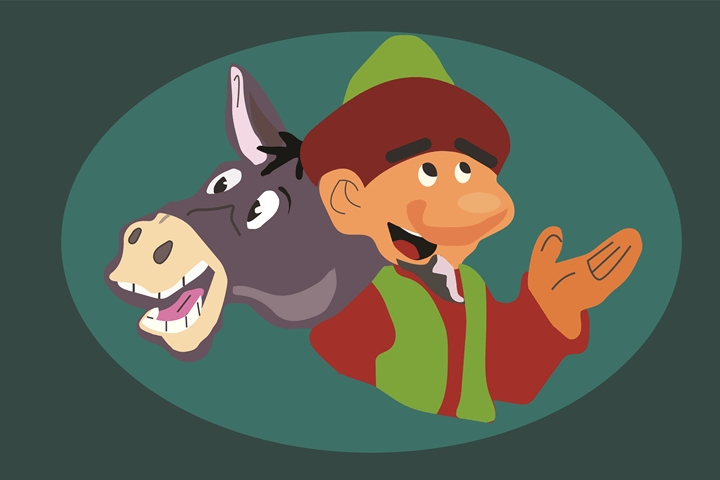Welcome to the heart of Middle Eastern folklore and humor! If you’re a learner of Arabic, you’ll quickly discover a character whose name brings a smile to everyone’s face: Juha. Known by different names across the world—from Nasreddin Hodja in Turkey to Mulla Nasruddin in Central Asia—Juha is the witty, sometimes foolish, and always lovable hero of countless short stories. His cleverness often appears in the most unexpected ways, teaching valuable lessons about life, common sense, and human nature. Reading Juha stories is one of the best ways to practice your Arabic, as the tales are short, humorous, and full of everyday vocabulary.
Who is Juha and Why Are His Stories So Popular?
Juha (جُحَا) is more than just a character; he is a symbol of popular wisdom and satire. His tales have been passed down for centuries, making him a staple of Arab culture. He often appears as an ordinary man who, through his simplicity, exposes the folly and hypocrisy of others. The humor in these tales often comes from the contrast between his actions and the reactions of the people around him.
The stories are perfect for beginners because they are:
- Simple and Clear: The language is direct and easy to follow.
- Engaging: The humor and unexpected twists keep you interested.
- Culturally Rich: They offer a window into the Arab way of life and common values.
A Classic Tale: Juha and His Donkey
One of the most famous and beloved stories features Juha and his donkey. This story perfectly captures his blend of wisdom and perceived foolishness. Let’s read a classic version of the tale of Juha and the donkey.
English Version
The Story of Juha and the Donkey
One day, Juha and his son were traveling to the market. Juha was walking and his son was riding the donkey. On the road, they passed by some people. One of them said, “Look at the selfish boy! He’s riding while his poor old father is walking.”
Juha heard this and felt ashamed. He told his son, “Come, let’s both ride the donkey.” So, they both rode. A little later, they passed by another group of people. One of them said, “Look at these two cruel men! They are both riding a small, weak donkey! They have no mercy on the poor animal.”
Juha felt even more ashamed. He told his son, “Let’s both get off and walk.” So, they both walked. After a while, they passed by a third group. One of them said, “Look at those two fools! They have a donkey and they are both walking! Why don’t they ride it?”
Juha was very angry and frustrated. He looked at his son and said, “It seems we will never please everyone. Let’s just do what we think is right.” Then, he picked up the donkey and put it on his back! The people laughed and laughed.
Arabic Version
قصة جحا وحماره
في يوم من الأيام، كان جحا وابنه مسافرين إلى السوق. كان جحا يمشي وابنه يركب على الحمار. في الطريق، مروا ببعض الناس. قال أحدهم: “انظروا إلى هذا الولد الأناني! هو يركب بينما والده العجوز المسكين يمشي
سمع جحا هذا الكلام وشعر بالخجل. قال لابنه: “تعال، لِـنَركَبْ على الحمار معًا.” فركبا هما الاثنان. وبعد قليل، مروا بمجموعة أخرى من الناس. قال أحدهم: انظروا إلى هذين الرجلين القاسيين! كلاهما يركب حماراً صغيراً وضعيفاً! ليس لديهما رحمة بالحيوان المسكين
شعر جحا بالخجل أكثر. قال لابنه: “هيا ننزل ونمشي.” فمشيا هما الاثنان. وبعد فترة، مروا بمجموعة ثالثة. قال أحدهم: “انظروا إلى هذين الأحمقين! لديهما حمار ويمشيان! لماذا لا يركبانه؟”
غضب جحا جداً وشعر بالإحباط. نظر إلى ابنه وقال: “يبدو أننا لن نُرضيَ كل الناس أبدًا. لنفعل فقط ما نعتقد أنه صحيح.” ثم رفع الحمار ووضعه على ظهره! ضحك الناس وضحكوا.
Why the Story of Juha and His Donkey Is a Great Learning Tool
This famous tale teaches an important life lesson: you can’t please everyone. But for an Arabic learner, it also provides an excellent opportunity to practice:
- Verbs: Verbs like يَمْشِي (yamshī – to walk), يَرْكَب (yarkab – to ride), يَقُول (yaqūl – to say).
- Nouns: Nouns like سُوق (sūq – market), حِمَار (ḥimār – donkey), رَجُل (rajul – man).
- Adjectives: Adjectives like أَنَانِي (anānī – selfish) and مِسْكِين (miskīn – poor/pitiable).
- Common Phrases: Phrases like في يوم من الأيام (fī yawm min al-ayyām – one day) and في الطريق (fī aṭ-ṭarīq – on the road).
Exploring Juha stories is a fantastic and fun way to boost your Arabic skills. The next time you want a break from grammar books, look for more tales of Juha to laugh and learn at the same time.
Ready to read more entertaining Juha stories and master your Arabic skills with cultural context? Visit www.kaleela.com and download the Kaleela Arabic learning app today! Our comprehensive lessons are filled with engaging content and fun stories to make your learning journey as enjoyable as a tale from Juha himself!




